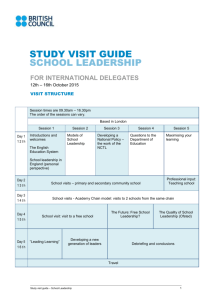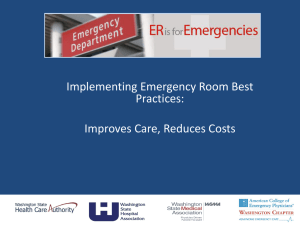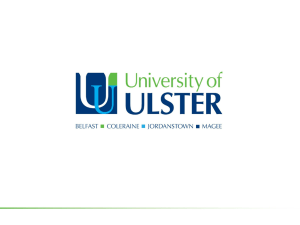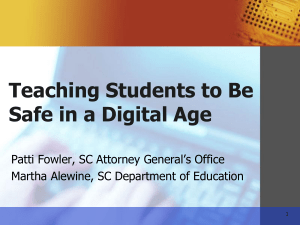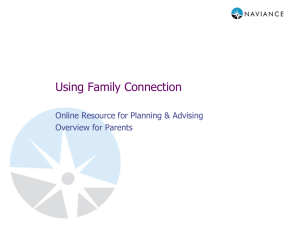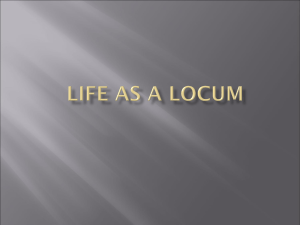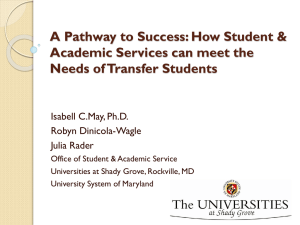Educational Visits - Dereham St. Nicholas Junior School
advertisement
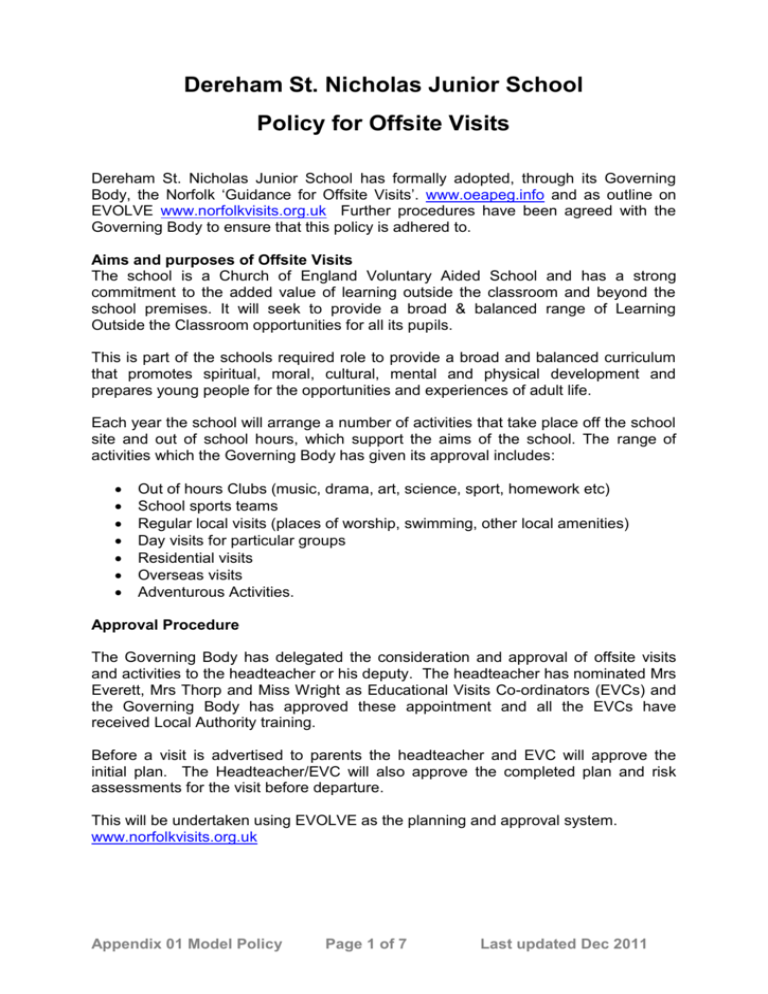
Dereham St. Nicholas Junior School Policy for Offsite Visits Dereham St. Nicholas Junior School has formally adopted, through its Governing Body, the Norfolk ‘Guidance for Offsite Visits’. www.oeapeg.info and as outline on EVOLVE www.norfolkvisits.org.uk Further procedures have been agreed with the Governing Body to ensure that this policy is adhered to. Aims and purposes of Offsite Visits The school is a Church of England Voluntary Aided School and has a strong commitment to the added value of learning outside the classroom and beyond the school premises. It will seek to provide a broad & balanced range of Learning Outside the Classroom opportunities for all its pupils. This is part of the schools required role to provide a broad and balanced curriculum that promotes spiritual, moral, cultural, mental and physical development and prepares young people for the opportunities and experiences of adult life. Each year the school will arrange a number of activities that take place off the school site and out of school hours, which support the aims of the school. The range of activities which the Governing Body has given its approval includes: Out of hours Clubs (music, drama, art, science, sport, homework etc) School sports teams Regular local visits (places of worship, swimming, other local amenities) Day visits for particular groups Residential visits Overseas visits Adventurous Activities. Approval Procedure The Governing Body has delegated the consideration and approval of offsite visits and activities to the headteacher or his deputy. The headteacher has nominated Mrs Everett, Mrs Thorp and Miss Wright as Educational Visits Co-ordinators (EVCs) and the Governing Body has approved these appointment and all the EVCs have received Local Authority training. Before a visit is advertised to parents the headteacher and EVC will approve the initial plan. The Headteacher/EVC will also approve the completed plan and risk assessments for the visit before departure. This will be undertaken using EVOLVE as the planning and approval system. www.norfolkvisits.org.uk Appendix 01 Model Policy Page 1 of 7 Last updated Dec 2011 The School has agreed a policy for categorising its visits in line with NCC guidance i.e.: Level 3 visits must be approved via Evolve and the LA’s on-line approval gained. Level 2 Day visits approved at school level on Evolve by EVC & Head. Level 1 Local regular day visits this establishment has chosen to: [Delete as appropriate] A/ Use Evolve to record & approve all these visits, or B/ has posted a list of its Level 1 visits in the document library of Evolve & will use inhouse systems to record & approve such visits. It confirms that set of standard operating procedures or generic risk assessments existed for these visits. (To be posted in the Evolve Document Library). Level 3 = Overseas, Residential or Adventurous visits Level 2 = Day visits not in your establishments list of Level 1. [These must be approved on-line at school level on Evolve]. Level 1 = Local & regular visits that you have generic risk assessments’ & standard operating procedures for. Visits are supported which fulfill the following criteria and provide a sound basis for safe activity:* The activity is appropriate to the experience and maturity of the children involved. * The environment is suitable for the chosen activity. * The visit makes a full contribution to the overall aims and objectives of the school. * The visit makes a valid contribution to the curriculum of the school. * The visit facilitates continuity and progression. * The visit is properly researched, planned and organised. Staffing The school recognises the key role of accompanying staff in ensuring the highest standards of learning, challenge and safety on a school visit. Staff are encouraged and supported to develop their abilities in organising and managing visits. There will be a system within the school to allow less experienced members of staff to work alongside more experienced colleagues on visits. The selection of staff for offsite visits will be a key priority in the initial approval of any proposed visit. Staff will be suitably qualified and experienced for proposed activities. Page 2 of 7 The school values and recognises the contribution of volunteer adults and parent helpers assisting with offsite activities and visits. Any volunteer will be approved by both the Head and Visit Leader and is entered on the voluntary helpers list kept by the School. They will be carefully briefed on the scope of their responsibility. Where it is appropriate the school will ensure that CRB screening is available for volunteers. The appointed Visit Leader will be fully supported in the tasks required to arrange the visit. This will include, as necessary, making time or finances available to conduct an exploratory visit, briefing teachers and/or other staff, accessing training courses, reviewing and evaluating the visit or identifying time when the leader and EVC might work in partnership to undertake planning and risk assessments. Visit staff will not be under the influence of alcohol or other drugs such that their ability to recognise hazards or respond to emergencies is in any way restricted. Risk Assessment The Visit Leader will seek to identify any significant risks from any activity that is under their control and take appropriate steps to ensure all participants are safe. Good practice precautions and safety measures will be taken and this will be recorded in a risk assessment. External Activity Providers Where external contractors are involved in organising all or part of the visit, the contract will be made with the school on behalf of the pupils. All payments for the visit will be made through the school accounts. The Visit Leader will make appropriate checks before committing the school to the contract. This will include seeking assurances about health and safety, and any accreditation and licensing. Wherever possible the school will seek to use holders of the Learning Outside the Classroom Quality Badge for which no Providers Contracts or other assurance checks are required. Parental Consents Written consent from parents will not be required for pupils to take part in the majority of off-site activities organised by the school as most of these activities take place during school hours and are a normal part of a child’s education at school. However, parents will be told where their child will be at all times and of any extra information or measures required. Written consent will be requested for activities that need a higher level of risk management or those that take place outside school hours. The school has a standard form, which will be used for this purpose. As part of the parent consent they will be fully informed of the activities and arrangements for the visit. For all residential visits parents will be invited to a briefing meeting where they can ask for clarification of any aspect of the itinerary and organisation of the visit. Page 3 of 7 The school has policies for Charging and Remissions, Behaviour and Inclusion, which applies to all visits. The expectations of Pupils and Parents The school has a clear code of conduct for school visits based on the school ‘Behaviour Policy’. This code of conduct will be part of the condition of booking by the parents. Pupils, whose behaviour is such that the Visit Leader is concerned for their safety, or for that of others, can be withdrawn from the activity. The Visit Leader will consider whether such pupils should be sent home early and parents will be expected to cover any costs of the journey home early. Emergency Procedures The school will appoint a member of the Senior Management Team as the emergency contact for each visit. All major incidents should immediately be relayed to this person, especially those involving injury or that might attract media attention. The Visit Leader will leave full details of all pupils and accompanying adults on the visit with the emergency contact, including the home contact details of parents and next-of-kin, as appropriate. All incidents and accidents occurring on a visit will be reported back and recorded following normal school procedures for reporting and investigating accidents. Review by the Local Authority The school is supported in its arrangements for offsite visits by the County Council. Where necessary the school will seek advice from the Adviser for Outdoor Learning. All visits that involve an overnight stay, going abroad and any that involve adventurous activities will be notified to the LA prior to departure. The LA will provide an independent reassurance check of the plan and the precautions and safety measures that will be taken. Some sample monitoring will also be undertaken by the LA & the school agrees to facilitate this when & where required. Any advice provided will be fully considered prior to the trip taking place. Charging for Activities and Visits The school may invite, but not require, parents to make voluntary contributions for school activities in order to enhance what is otherwise provided. There is no obligation to contribute and pupils will not be treated any differently according to whether or not their parents have made a contribution. The level of contribution will be calculated for each activity and may include, for example, an element to cover the participation by young people from low-income families or the cost of travel for accompanying teachers. Some activities may not take place if parents are reluctant to support it Page 4 of 7 The school will comply with the law in relation to charges that may be made for the cost of activities provided outside school hours, within school hours and for board and lodging on residential courses. The school has a policy on remission of charges stating how much they are prepared to contribute etc. All payments for visits will be made through the appropriate school account including the Field Visit Account for the Year 6 residential visit. This account is subject to audit following each visit and the Governors receive a copy of the audited account. Evaluation The Group Leader with the EVC will evaluate all visits. A short evaluation report will be made available for the Governing Body on request. The EVC will ensure that any risk assessments on the trip are dated as having been evaluated and/or modified as a result. The Group Leader (with administrative assistance) is responsible for presenting a financial account for the visit, which will be audited as part of the schools’ procedures This policy was adopted by the Governing Body on 16th May 2012 It should be reviewed no Later than July 2016 Page 5 of 7 Charging Policy - Appendix Policy Regarding Refunds for School Journeys or Visiting Speakers: The method of calculating the level of contribution for most activities is to ascertain the cost of staging a visit or activity and dividing this amount by the number of children taking part. This figure will then be rounded to make an appropriate amount for collection. e.g. Museum visit: Three coaches at £120 Entrance fees at 75p per head. 112 children Cost per head = £540 / 112 = £4.82 =+75p = £5.57 The suggested level of contribution may be £5.50 depending upon subsidy. This allows no leeway for parents who may decline to make a contribution. Generally the school will meet any shortfall, up to between 5 & 10% beyond which the visit is likely to be cancelled. If there are a number of parents who have indicated that they are not prepared to make contributions for any visit then it may be decided to increase the level of contribution requested to ensure that the shortfall is not too great. There will be no attempt to make a profit on educational visits. However, if more money is taken than spent it is not usual to make a refund because the amounts are too small to make this feasible. There are visits where the level of the expenditure is on a large scale. Here we are particularly thinking about the residential visit in Year 6. The individual cost can vary greatly dependent upon the number of children taking part which can alter during the year as some tend to drop-out and so the following policy is adopted. Costs are estimated on current information in June one year for the visit the following year and the size of contribution requested is calculated on the basis of a party of 40 children for a week. There are some occasions when more than 40 children will travel and some occasions when the final number will be less. On this basis the account will be in credit some years whilst on other occasions there will be a deficit. On this basis we can stabilise the level of contribution requested so that there are not wild fluctuations from one year to the next. On this basis refunds are not given to parents at the end of a visit nor are additional charges made if extra costs are incurred. For all visits, if a child is unable to take part due to illness or for disciplinary reasons then a full refund will be made unless substantial expenditure has already been incurred on behalf of the individual child which the school is unable Page 6 of 7 to reclaim or else, there was specific agreement concerning the payment of nonrefundable deposits. Optional The School may wish to make a public pledge & or become a signatories to the Learning Outside the Classroom Manifesto, or in its school policy endorse it. http://www.teachernet.gov.uk/teachingandlearning/resourcematerials/outsidecl assroom/ Pledge to Learning Outside the Classroom Manifesto. (LOtC) Manifesto summary Every young person should experience the world beyond the classroom as an essential part of learning and personal development, whatever their age, ability or circumstances. These, often the most memorable learning experiences, help us to make sense of the world around us by making links between feelings and learning. They stay with us into adulthood and affect our behaviour, lifestyle and work. They influence our values and the decisions we make. They allow us to transfer learning experienced outside to the classroom and vice versa. Learning outside the classroom is about raising achievement through an organised, powerful approach to learning in which direct experience is of prime importance. This is not only about what we learn but importantly how and where we learn. These experiences can take place in the school grounds; local nature reserves and wild places; city farms and parks; streetscapes; field study centres; farms and the countryside; remote wild and adventurous places; heritage and cultural sites; zoos and botanic gardens; places of worship; museums, theatres, galleries and music venues; and on cultural, language and fieldwork visits abroad. The Manifesto can involve everyone who sees the benefits to young people, such as Government, Head teachers, governors, teachers and support staff, parents, local authorities, community and voluntary organisations, curriculum subject bodies, businesses and all those agencies that provide external support to schools. Page 7 of 7
